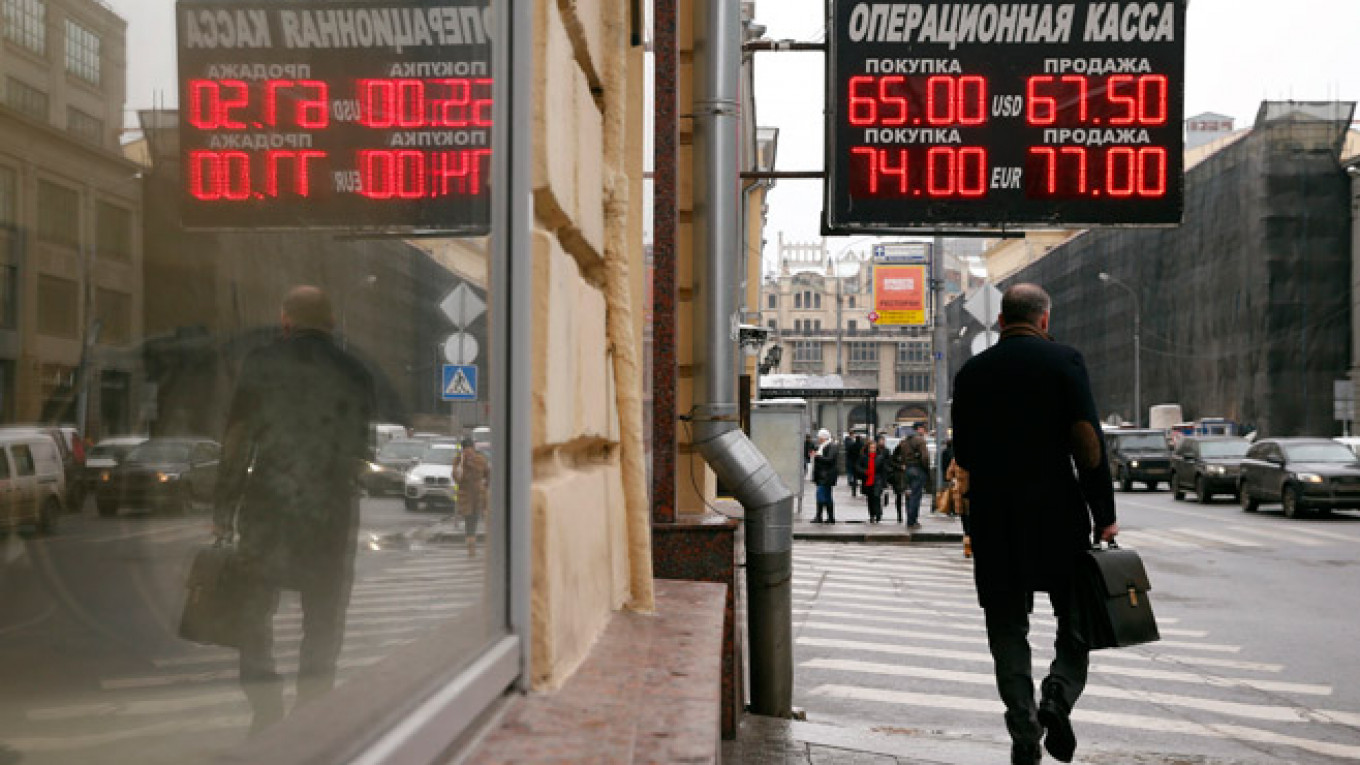While the economic indicators are set to worsen considerably over the next few months, investors have become a lot more sanguine about Russia risk. Since the start of the year, to the middle of this week, the RTS Index gained 12.3 percent and MICEX added 20.4 percent.
That is partly because of the 6 percent increase in the price of Brent crude which has encouraged a speculative play on what had become very cheap assets after last year's markets collapse. A lot of the gain also reflects the optimism that Russia, Ukraine and the European Union may be finally engaged in a credible process to agree a peace deal in eastern Ukraine which may lead to an easing of sanctions.
That certainly is a good enough reason in its own right to justify a much bigger rally in asset valuations in the coming days and weeks, albeit the big global emerging market investment funds will still wait until they are sure any deal agreed can hold and be secured longer term. EU leaders and the U.S. administration will likely take a similar view about sanctions.
But another reason why investors have become somewhat more optimistic about Russia risk is the better response from the Russian government since the start of the year and, with it, a better understanding of the country's real financial position.
For much of last year it seemed as if government agencies were doing no more than knee-jerk reacting to unfolding events and with more than a hint of a shell shock overlay. There was no evidence of a coordinated response to the worsening crisis and that added to the loss of investor confidence.
It seemed as if the only state strategy was to dismiss the sanctions and ignore the weakening indicators because oil revenues would save the day. The quick collapse in the oil price from early September came as a shock to the system. The spike in the benchmark interest rate at 2 a.m. on Dec. 16 smacked of panic and directly contributed to the 30 percent session volatility in the ruble market later that day.
At the end of last year there was a real concern that the banking sector was heading for a crisis, which could then lead to a more serious collapse in the economy. There was also widespread reporting in the Western media that Russia was running short of money and might not be able to service its foreign debt obligations much beyond the end of this year.
All of which went largely unchallenged by the government, which has long since become notorious for not paying enough attention to basic public relations and image management. That consistent negative message reverberated though 2014 and was a major factor in the collapse in equities and debt prices.
But the long New Year's break seems to have had a positive effect on policymakers. They appear to have gotten their act together since the return to work in mid-January. It helps that the government does actually have the data to support a stronger message.
For example, the federal budget would have reported a surplus equal to 0.9 percent of gross domestic product for last year had it not been for the 1 trillion ruble transfer to the Deposit Insurance Agency to allow for a recapitalization of the major banks. That transfer should ensure that none of the major banks will have any funding problems this year and removes the risk of a bank sector crisis.
The Central Bank is expected to use this crisis to make more progress in cutting the number of licensed banks in the country. Currently there are more than 870 bank licenses while there should not be much more than 200 — or even less. But there is no reason to expect that any closures and bailouts will not continue to be handled as efficiently as the recent bailout of Trust Bank, and the budget transfer will ensure that money is in place to support the process.
The Central Bank also made some personnel changes, such as the appointment of an experienced head of the monetary policy department, a move that was met with relief within the banking community. For sure the changes will not alter the fact that if the oil price goes down, then so too will the ruble exchange rate. Both are very likely in the coming weeks, but the management of the process should be much more measured, and, therefore, there should be less volatility in the marketplace.
Other administrative measures, such as monitoring the foreign exchange activities of the local banks and persuading the state-controlled exporters to bring more foreign currency back into the country earlier will also help create a less volatile market and allow the Central Bank to stick with its commitment of no formal capital controls.
Last year Russian companies cut total external debt by $130 billion, largely because they were not able to refinance obligations falling due. That meant that Russia's total external debt at the end of the year was equal to 30 percent of GDP, a very favorable debt ratio when compared with many of the world's major economies, which have debt in excess of 100 percent debt to GDP.
If the total debt which is denominated in rubles is excluded along with the total owed to Russian counterparties in such offshore financial zones as Cyprus, then the total payable to third parties in a foreign currency falls to about $360 billion or roughly the size of the country's liquid foreign exchange assets.
Of course, that total is payable over several years and while the total payable externally this year is estimated at just over $100 billion, less than $60 billion is due on non-ruble debt and outside of intra-Russian company repayments. If push comes to shove, that later portion could easily be deferred.
For 2014, Russia ran a current account surplus of almost $60 billion on the back of a rise in the positive external trade balance to almost $186 billion. It will run another surplus this year as imports remain low due to weak demand and the weak ruble. That money replenishes foreign exchange reserves. Designating several hundred strategically important companies who qualify for state assistance in the event of financial strains also helped calm fears of corporate sector defaults.
Capital flight, which is reported at $152 billion for last year, is also often erroneously cited as additional capital flowing out of the country. The impression given is of people packing suitcases with cash to deposit in foreign banks.
In reality, that is double counting. Capital flight is mostly the debt repayment along with remittances for foreign workers to other CIS countries and normal trade flows.
None of this will prevent the economy slowing very sharply this quarter and probably through the second quarter too. What happens in the second half will depend on where oil trades and when sanctions start to ease. The result will also depend on what policy response and actions we see from the government.
For now there can be no doubt that the only strategy is one of survival and a containment effort. But when compared to the near-chaos and lack of clear information flow of last year, the changes seen so far in 2015 are a lot more encouraging. Let's hope they keep it up.
Chris Weafer is a senior partner with Macro Advisory, a consultancy advising macro hedge funds and foreign companies looking at investment opportunities in Russia.
A Message from The Moscow Times:
Dear readers,
We are facing unprecedented challenges. Russia's Prosecutor General's Office has designated The Moscow Times as an "undesirable" organization, criminalizing our work and putting our staff at risk of prosecution. This follows our earlier unjust labeling as a "foreign agent."
These actions are direct attempts to silence independent journalism in Russia. The authorities claim our work "discredits the decisions of the Russian leadership." We see things differently: we strive to provide accurate, unbiased reporting on Russia.
We, the journalists of The Moscow Times, refuse to be silenced. But to continue our work, we need your help.
Your support, no matter how small, makes a world of difference. If you can, please support us monthly starting from just $2. It's quick to set up, and every contribution makes a significant impact.
By supporting The Moscow Times, you're defending open, independent journalism in the face of repression. Thank you for standing with us.
Remind me later.








